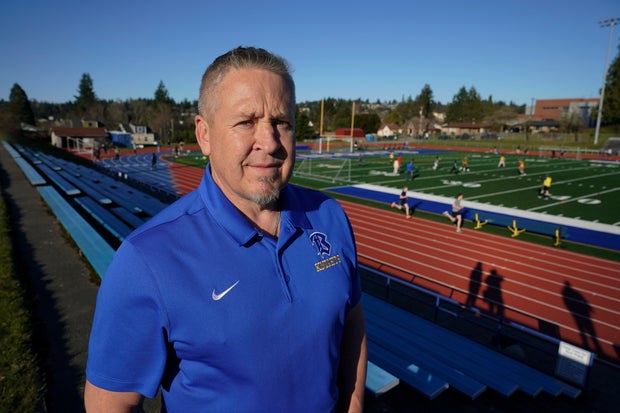Washington — The Supreme Court convened Monday morning to hear arguments in a case brought by a former high school football coach from Washington state who lost his job after praying on the 50-yard-line after games.
The legal dispute between Joseph Kennedy and the Bremerton School District over Kennedy’s practice of praying after the final whistle began in August 2016, when the former coach sued the district, arguing it violated his constitutional rights to free speech and free exercise when he was punished for failing to comply with its directives prohibiting “demonstrative religious activity” that is “readily observable” by students or members of the public.
Kennedy lost in two earlier rounds in the lower courts, and the justices in 2019 declined his appeal of a decision from the 9th U.S. Circuit Court of Appeals in favor of the district. But after asking the Supreme Court for a second time in September to take up his case, the justices agreed to do so.
An assistant coach for the Bremerton High School varsity football team, Kennedy decided he would pray at the conclusion of games after watching the sports film “Facing the Giants” in 2008. While he said the practice began with him alone, briefly thanking God for keeping the players safe, for fair play and for spirited competition, he was eventually joined by members of the Knights football team who asked if they could kneel alongside him.
Ted S. Warren / AP
Kennedy’s prayers evolved into motivational speeches with religious references, and his practice continued without issue until September 2015, when an opposing team’s coach told Bremerton High School’s principal that Kennedy asked his players to join him for the post-game prayer and “thought it was pretty cool” the district would allow such activity.
The observation served as the catalyst for the yearslong battle between Kennedy and the school district, the venue for which shifted from the gridiron to the courts when the coach lost his job after defying directives to end his practice of praying on the field.
Kennedy argues he was engaging in constitutionally protected religious speech. But lawyers for the district say he was acting as an agent of the state who, as a public-school employee, violated the religious freedom of students who felt pressure to join him in prayer.
The dispute has attracted a slew of friend-of-the-court briefs ranging from current and former National Football League players, former collegiate athletes and coaches, and members of Congress.
In one brief filed in support of Kennedy on behalf of Minnesota Vikings quarterback Kirk Cousins, Chicago Bears quarterback Nick Foles and former NFL quarterback Drew Stanton, among others, the current and former players invoked Colin Kaepernick — though at first not by name — kneeling during the national anthem to protest racial injustice.
“That practice, like Kennedy’s prayers, is controversial — courageous to some and offensive to others,” they argued. “But if Joe Kennedy had taken a knee to protest racial injustice, the district almost certainly would not have argued that his speech was somehow the state’s. Rather, there would have been no question that it was protected private speech.”
But a group of former professional football players and collegiate athletes in support of the school district warned the relationship between a coach and athlete in high school athletics is unique, as it is “highly susceptible to being coercive,” and should be considered by the Supreme Court as it weighs the case.
“The record here demonstrates that Mr. Kennedy’s actions had the propensity to, and did, lead players to feel compelled to participate in Mr. Kennedy’s expressions of faith even if they would rather not have done so,” the former athletes, including former Minnesota Vikings punter Chris Kluwe and former NFL running back Obafemi Ayanbadejo.
A decision from the Supreme Court is expected by the end of June.
